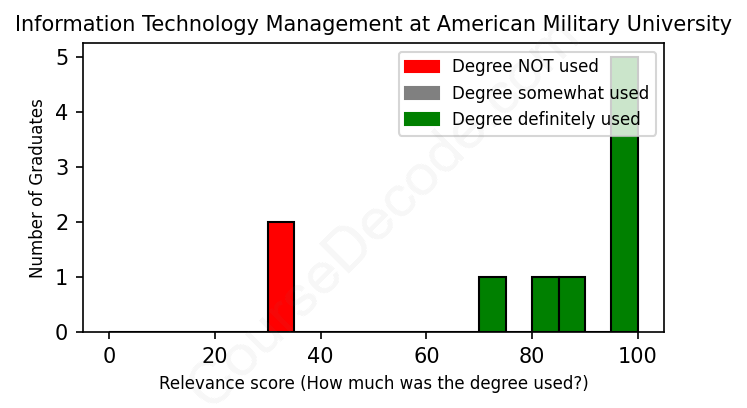
First, some facts. Of the Information Technology Management graduates from American Military University we've analyzed , here's how many have used (or NOT used) their degree in their career:

These are estimates based on AI analysis of 10 LinkedIn profiles (see below).
The verdict? Significantly above average. Overall, with an average relevance score of 80%, Information Technology Management graduates from American Military University have a much higher likelihood (+13%) of finding work in this field compared to the average graduate across all fields:
And for comparison, here's the chart for all profiles we've looked at across all degrees.
Also, after graduating, 40% of these graduates have pursued further education other than another Bachelor's degree (such as a Masters degree or other), compared to the average across all profiles of 35%. This suggests you may need more than just a Bachelors degree to be competitive as a Information Technology Management graduate.
See the details:
|
Relevance score: 72% We think this person has gone into a career highly relevant to their degree. We think this person has gone into a career highly relevant to their degree.
DEGREE INFOGraduated in 2018 from American Military University with a Bachelor of Science - BS in Information Technology Management. No other secondary education since. JOB HISTORY SINCE GRADUATIONChange Management at MITSC- Kingfisher Systems, Inc. Jun 2020 - Apr 2021 Change Manager  United States Marine Corps Apr 2021 - Present Future Operations Officer  MCI East May 2021 - Present ABOUTA Strategic Planner and Senior Data Systems Engineer with 26 years of communications experience that possesses a keen sense of anticipating and supporting operational and strategic communications requirements. Takes pride in discovering new methods of providing solutions in order to turn concepts into reality. |
The top 10 most common jobs done by the graduates we've analyzed (ranked most common to least) are:
From what I've seen, a lot of graduates from American Military University with a degree in Information Technology Management end up in roles that are pretty well aligned with their studies. Common job titles include Systems Administrator, System Engineer, and various Senior Engineer roles, like Senior Enterprise Unified Communications Engineer and Senior System Administrator. These positions typically require a solid understanding of IT systems and management skills, which are core parts of the curriculum in IT Management. In fact, jobs like Client Systems Instructor Supervisor and Client Systems Flight Chief directly utilize IT management principles and responsibilities, showing a strong connection to their degree.
However, not every job on the list appears to relate strongly to Information Technology Management. For instance, some roles like Facility Manager and Administrative Services Manager are more focused on administrative or management tasks and don't tap into specific IT skills. Even some jobs within the military, such as Field Artillery Officer, don’t really involve IT management duties. Overall, while many graduates find themselves in relevant IT roles, there’s still a noticeable portion of them taking on jobs that don’t fully leverage the expertise from their degree. This mix suggests that having a degree in Information Technology Management can open doors, but not all paths taken are directly within IT management itself!
Here is a visual representation of the most common words in job titles for Information Technology Management graduates (this is across all Information Technology Management graduates we've analyzed, not just those who went to American Military University):

From the profiles of graduates with a degree in Information Technology Management from American Military University, it looks like most folks kick off their careers in a pretty tech-oriented direction. Many started out as systems administrators, engineers, or IT specialists soon after graduation, which lines up perfectly with what you'd expect from this type of degree. For example, there are graduates who have moved from being an Information Systems Engineer to a Senior Exchange Systems Engineer within just a few years. This kind of progression indicates that graduates often land solid entry-level jobs where they can apply their knowledge right away and then move up the ladder as they gain experience and skills.
Fast forward five to ten years, and it seems like quite a few of these graduates have maintained careers in IT or related fields. Some have taken on senior roles or managerial positions, particularly within organizations like the Air Force or various tech firms. Others have found niches in more specialized areas, like full-stack development or change management within the military. While a few individuals have branched out into roles that are a bit removed from pure IT, like facility management, the majority appear to be doing well by staying in tech-related careers. Overall, these career trajectories suggest that graduating from AMU with this degree can indeed lead to successful and relevant careers in Information Technology Management.
Getting a Bachelor’s degree in Information Technology Management can be a bit of a mixed bag—it depends a lot on your interest in the subject and your prior experience with tech stuff. At American Military University, I’d say the workload is pretty manageable for most students, especially if you have a knack for computers and networks. The courses are designed to be accessible, but you'll still need to put in some time to really grasp the material, especially if math or programming isn’t your thing. Overall, it’s not necessarily harder than the average college degree, but it definitely requires dedication and a willingness to learn, so just be prepared to hit the books and engage with the material!
Most commonly, in the LinkedIn profiles we've looked at, it takes people 4 years to finish a Bachelor degree in Information Technology Management.
From what I can see, it looks like these IT Management grads from American Military University are doing pretty well for themselves! Most of them have climbed up the corporate ladder to senior-level roles or management positions, which generally means better pay. For example, the person who moved from systems engineer to senior enterprise unified communications engineer is likely raking in a decent salary now. Even the ones starting off in military roles had solid upward mobility, landing managerial positions after some years. Overall, while exact salaries can vary, the career trajectories suggest they’re making some decent money in the tech field!
Here is a visual representation of the most common words seen in the "about" section of LinkedIn profiles who have a Bachelor degree in Information Technology Management (this is across all Information Technology Management graduates we've analyzed, not just those who went to American Military University). This may or may not be useful:

Here are all colleges offering a Bachelor degree in Information Technology Management (ordered by the average relevance score of their Information Technology Management graduates, best to worst) where we have analyzed at least 10 of their graduates:
| College | Score | Count |
|---|---|---|
 American Military University American Military University
|
80 | 10 |